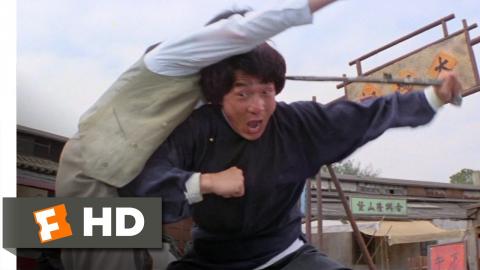DRUNKEN MASTER II: Staggering Toward Immortality

DRUNKEN MASTER II
These notes on Drunken Master II (1994) were written by Lance St. Laurent, PhD candidate in UW Madison’s Department of Communication Arts. A new 4K DCP restoration of Drunken Master II will screen on Friday, April 21 at 7 p.m. The screening takes place at 4070 Vilas Hall, 821 University Avenue. Admission is free!
By Lance St. Laurent
Jackie Chan triumphantly returned to the role of Chinese folk hero Wong Fei-hung in 1994’s Drunken Master II—a follow-up to the early Jackie hit Drunken Master (1978)—but its road to American movie screens is a misadventure in itself. For the sequel, venerable martial arts filmmaker Lau Kar-leung (The 36th Chamber of Shaolin) steps in for the original Drunken Master director Yuen Woo-Ping in his first and only collaboration with Chan. The pairing of these legends proved as rollicking, death-defying, and balletically buffoonish as one could ever hope, despite reports that Chan (an accomplished director in his own right) and Lau clashed on set. The 40-year-old Chan was about to make his official move to the United States, so Drunken Master II was something of a hometown swan song for the star. As we can see in the film (including the traditional end credits bloopers comprised of botched stunts), Chan made the most of this final bow, perfecting the combat and physical comedy of the first film and expanding the scale with his then-signature Keaton-esque feats of derring-do. The results are nothing short of extraordinary, a merging of two artists at the zenith of their powers, at once elegantly classical in its filmmaking and jaw-dropping in its physical complexity.
The film sees Chan’s bumbling Wong pitted against British imperialists in early 20th century China, fighting an ever-growing number of goons and soldiers to keep Chinese relics out of the hands of the empire. Much to the chagrin of his father, Wong’s fighting prowess is fueled by his drinking, giving a comic literalism to the “drunken boxing” style of kung-fu. Fighting across a number of dangerous locales (including under a moving train) and against various fighting styles, Chan chugs and slugs his way through an array of mind-blowing, body-breaking set pieces all leading to an extended, go-for-broke finale that stands as one of the most spectacular in either Chan's or Leung’s careers. As a work of comedy, of action, and of cinematic spectacle, it is almost peerless, not just in Hong Kong.
American audiences, however, did not get to experience Chan and Lau’s opus for years after its original release, despite Chan’s international stardom and rapturous reviews from overseas. Furthermore, the version of the film released stateside and later circulated on DVD represents a compromised vision, one that has only recently been restored to its proper glory. In 1994, the film saw an extremely limited release in the states, playing only in a few small markets with overwhelmingly immigrant filmgoing audiences. There was no proper American distributor and no home video release to speak of. After the success of 1998’s Rush Hour catapulted Chan to a new level of American fame, the film was finally picked up for distribution by Miramax and Dimension films in 2000. Miramax at this time was fronted by the Weinstein brothers, and Harvey in particular had developed a notorious reputation in his handling of foreign films. The Weinsteins were savvy observers of the independent and international film marketplace, and their stable of projects and awards throughout the nineties bears out this reputation. However, such projects were also subject to the demands of “Harvey Scissorhands”, who would cut films with little or no input from the original filmmakers in order to conform to more mainstream sensibilities. Drunken Master II was one such film. The film’s original (admittedly off-color) ending is the one major cut, but the original American release version of the film also features a new musical score, new sound effects, an English-language dub, and most notably, a completely different title: The Legend of the Drunken Master. As the plot of the sequel has no direct connections to the original, this final move was a practical one to attract a wider audience with no familiarity with the original film. As for the rest of the changes, they can hardly be said to have ruined the film, but the compromised version’s mere existence kept the original version completely inaccessible for decades. Only in 2021 did Warner Bros. make available the original, untouched Drunken Master II, over 20 years after its American theatrical bow, and over 25 years since since its original release.
